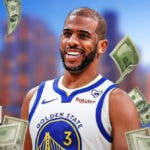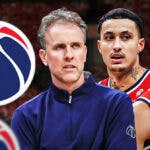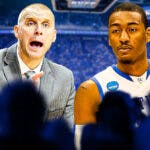Things have suddenly gone from bad to worse for John Wall and the Washington Wizards. Wall's season ended in late December, when he finally decided to go under the knife to alleviate nagging pain in his left heel. The Wizards were just 13-22 at the time, 11th in the Eastern Conference, beset by their franchise player's distinct inability to affect the game with the unparalleled speed and explosiveness that first propelled him to stardom.
Surgery always made the most sense for Wall. Not only was Washington going nowhere meaningful in 2018-19, but playing through pain for much longer would only have increased the risk Wall never fully regains the athleticism that's long helped cover up his lack of world-class skill compared to other star point guards.
It's not like the Wizards had much of a choice, either. Wall signed a four-year, $170 million extension to his existing contract with Washington in the summer of 2017. He'll earn a whopping $37.8 million when the extension kicks in next season, and has a player option of $46.8 million for 2022-23, at which point he'll be on the verge of his mid-thirties.

The trade market, believe it or not, is pretty dry for aging point guards with expansive injury histories who need the ball in their hands to thrive. Washington, which to this point has steadfastly refused pleas to blow up its current roster and start from scratch, is stuck with Wall over the next few years for better or worse.
The notion that he'd serve as more of a contractual albatross than on-court panacea going forward was widely accepted even before Wall shut down his season for good. Tuesday's news that he'll require additional surgery after rupturing his left Achilles tendon during a slip and fall at home only lends further credence to that depressing notion. Achilles ruptures have replaced ACL tears as the most debilitating injury to NBA players.
Rudy Gay, and if early returns of his play with the Golden State Warriors are any indication, DeMarcus Cousins have fared far better than anticipated since returning from corrective surgery on their Achilles tendons, but it still goes without saying this setback makes John Wall even less attractive to potential suitors should the Wizards elect to put him on the trade block.

Taking that action and ultimately pulling the trigger on a deal would almost undoubtedly make it even more difficult for Washington to re-emerge as a threat in the East. All-Star guard Bradley Beal has played the best basketball of his career since Wall went down, averaging 27.3 points, 5.5 rebounds, and 5.8 assists per game on solid efficiency while taking the reins of the Wizards' offense.
The 25 year old is both the present and future in the nation's capital, but not the type of singular force who can drive a team to the playoffs all by himself. Beal needs help, and the financial constraints placed on the Wizards by Wall's extension means most of that support will need to be found in the draft unless Ernie Grunfeld is able to unload that onerous contract. One problem: Doing so would definitely require the sweetener of at least one first-round pick, perhaps more, and likely an incumbent young player who would be of use to both Washington and any theoretical trade partner down the line.
Where do the Wizards go from here?

The silver lining is that Wall's achilles rupture and his subsequent timeline for recovery shouldn't much change their approach to roster-building. It was always going to be impossible for Washington to move Wall's salary without including valuable assets or taking back bad contracts. Maybe this development is the push management needs to finally address the ugly realities of a veteran, capped-out team that's never been good enough to win big come spring?
Beal is a free agent in the summer of 2020; the Wizards, somehow, must show him they're on the track toward contention between now and then, lest lose him for nothing. Grunfeld should be working the phones as we speak, doing all he can to immediately bite the bullet of trading Wall from a position of weakness, and begin the arduous task of picking up the pieces from there.
Wall's latest malady leaves that option as Washington's only hope, unfortunately, one that won't lead to meaningful on-court success any time soon either way.




